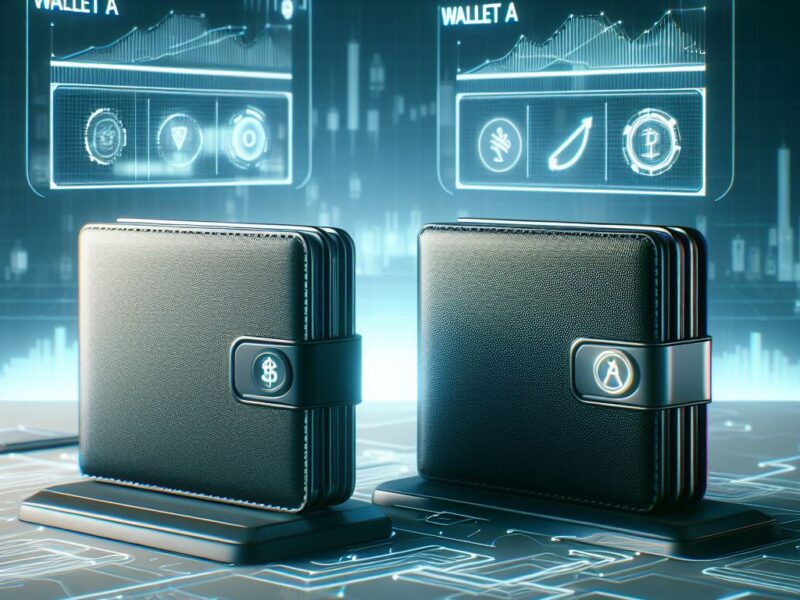In the cryptocurrency industry, securely storing your digital assets is very important. Crypto wallets serve as virtual vaults, enabling you to manage, send, and receive various cryptocurrencies safely. This blog post briefly lists and explains the various Fintechzoom crypto wallets and the factors to consider when choosing the best fit for your needs.

1. Hot Wallets
Hot wallets are connected to the internet, making them convenient but also less secure. They include:
-
Web Wallets
Web wallets are accessed through a browser and are often provided by exchanges or online wallet services. Examples: Coinbase, Blockchain.info.
-
Mobile Wallets
Mobile wallets are apps installed on your smartphone, providing easy access to your funds anywhere and anytime. Examples: Trust Wallet, Mycelium.
-
Desktop Wallets
Desktop wallets are installed on your computer and provide control over your private keys. Examples: Exodus, Electrum.
2. Cold Wallets
Cold wallets are offline, making them more secure but less convenient. They include:
-
Hardware Wallets
Hardware wallets are physical devices that store your private keys offline. They are considered the most secure option. Examples: Ledger Nano S, Trezor.
-
Paper Wallets
Paper wallets are printed private and public keys, often in the form of QR codes. They are secure but require careful handling.
Factors to Consider When Choosing a Wallet
1. Security
Look for wallets with strong security features, such as two-factor authentication and multi-sig support.
2. User Experience
Choose a wallet with a user-friendly interface and good customer support.
3. Supported Cryptocurrencies
Ensure the wallet supports the cryptocurrencies you want to store.
4. Reputation
Research the wallet provider’s reputation and read user reviews before making a decision.
Top Crypto Wallets
1. Ledger Nano S (Hardware Wallet)
The Ledger Nano S is a popular hardware wallet that supports over 1,100 cryptocurrencies. It features a secure chip and a PIN code for added security.
2. Trezor Model T (Hardware Wallet)
The Trezor Model T is another top-rated hardware wallet with a color touchscreen and support for over 1,000 cryptocurrencies.
3. Exodus (Desktop Wallet)
Exodus is a desktop wallet that supports over 100 cryptocurrencies. It provides a built-in exchange and portfolio tracking.
4. Trust Wallet (Mobile Wallet)
Trust Wallet is a secure mobile wallet that supports a large number of cryptocurrencies, including Binance Smart Chain tokens.
5. Coinbase Wallet (Web Wallet)
Coinbase Wallet is a popular web wallet that provides a user-friendly interface and support for multiple cryptocurrencies.
6. Mycelium (Mobile Wallet)
Mycelium is a well-established mobile wallet for Android and iOS. It supports Bitcoin and Ethereum, and provides advanced features like hardware wallet integration and a local trading marketplace.
7. Electrum (Desktop Wallet)
Electrum is a desktop wallet for Bitcoin. It has been around since 2011 and is known for its speed, security, and advanced features like multi-sig support and cold storage.
8. Atomic Wallet (Desktop & Mobile Wallet)
Atomic Wallet is a multi-currency wallet available for desktop and mobile devices. It supports over 300 cryptocurrencies and provides a built-in exchange, staking, and atomic swaps.
9. Argent (Mobile Wallet)
Argent is a user-friendly Ethereum wallet for iOS and Android. It provides a unique “guardians” feature for added security, as well as support for DeFi applications and ENS (Ethereum Name Service) integration.
10. MetaMask (Browser Extension & Mobile Wallet)
MetaMask is a popular Ethereum wallet that comes as a browser extension and a mobile app. It allows users to interact with decentralized applications (dApps) and securely store ERC-20 tokens.
Key Takeaways
1. Importance of securely storing cryptocurrencies using wallets, which act as virtual vaults for managing, sending, and receiving digital assets. Two main types of wallets:
- Hot wallets (web, mobile, desktop) connected to the internet for convenience but potentially less secure.
- Cold wallets (hardware, paper) offline for enhanced security but less convenient.
2. Factors to consider when choosing a crypto wallet:
- Security features like 2FA and multi-sig
- User experience and customer support
- Supported cryptocurrencies
- Reputation of the wallet provider
3. List of top crypto wallets:
- Hardware: Ledger Nano S, Trezor Model T
- Desktop: Exodus, Electrum
- Mobile: Trust Wallet, Mycelium, Argent
- Web: Coinbase Wallet, Blockchain.com, MetaMask
- Multi-platform: Atomic Wallet, Guarda Wallet
4. Hardware wallets like Ledger and Trezor are regarded as the most secure option for storing cryptocurrencies offline.
5. There are versatile wallets supporting multiple cryptocurrencies and providing features like built-in exchanges, staking, and DeFi integration.
Frequently Asked Questions
1. What is a crypto wallet and why do I need one?
A crypto wallet is a virtual vault that allows you to securely store, manage, send, and receive various cryptocurrencies. You need a wallet to safely hold your digital assets instead of leaving them on an exchange.
2. What’s the difference between a hot wallet and a cold wallet?
Hot wallets are connected to the internet (web, mobile, desktop) for convenience but are generally less secure. Cold wallets are offline hardware or paper wallets that provide enhanced security but less convenience.
3. Which type of wallet is more secure, hot or cold wallets?
Cold wallets like hardware wallets are considered the most secure option for storing cryptocurrencies as they keep your private keys offline and away from internet threats.
4. What are the main factors I should consider when choosing a crypto wallet?
Key factors include security features (2FA, multi-sig), user experience, supported cryptocurrencies, and the reputation of the wallet provider.
5. What are the advantages and disadvantages of hardware wallets?
Advantages are ultra-secure offline storage and backup capabilities. Disadvantages are higher cost and less convenience compared to hot wallets.
6. How do I set up and use a hardware wallet like Ledger or Trezor?
You’ll need to purchase the device, install software, create a PIN/recovery seed, and follow instructions to send/receive crypto while connected to supported interfaces.
7. Are mobile wallets secure for storing cryptocurrencies?
Mobile wallets provide convenience but are generally less secure than hardware wallets. Leading ones like Trust Wallet have solid security features though.
8. What are the key security features I should look for in a crypto wallet?
Two-factor authentication, multi-signature support, secure chips/elements, PIN codes, and recovery seed backups.
9. Can I store multiple cryptocurrencies in the same wallet?
Yes, many wallets like Exodus, Atomic, and Guarda support securely storing various cryptocurrencies in one wallet interface.
10. How do I backup and recover my crypto wallet if I lose access?
Most wallets provide a recovery seed phrase (12-24 words) that you must safely record and store to restore access to your wallet and funds.
11. What is a web wallet and how does it differ from desktop/mobile wallets?
A web wallet is accessed through a website/browser rather than downloaded software. They are convenient but potentially less secure.
12. Are there any fees associated with using certain crypto wallets?
Many wallets are free to use, but some charge fees for certain transactions or added features like hardware wallet costs.
13. How do I send and receive cryptocurrencies using my wallet?
You share your wallet’s receiving address to receive funds, and use the send function with the recipient’s address to transfer crypto out.
14. What is a paper wallet and how secure is it?
A paper wallet prints out your public and private keys, often as QR codes. It provides an extremely secure cold storage option if properly handled.
15. Can I use my crypto wallet to interact with decentralized applications (DApps)?
Yes, wallets like MetaMask allow you to connect and interact with Ethereum-based DApps from your wallet.









